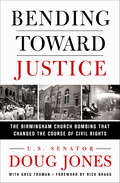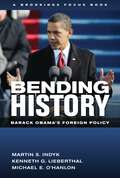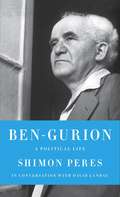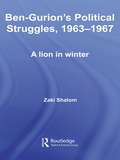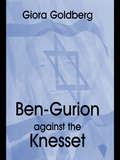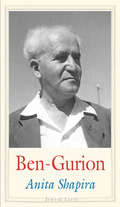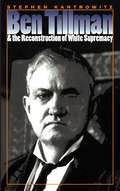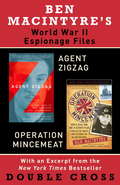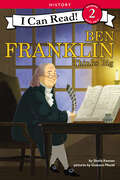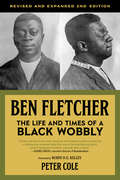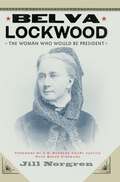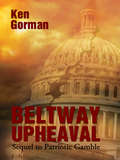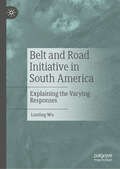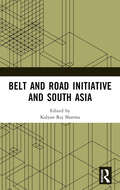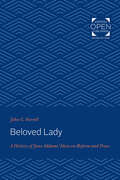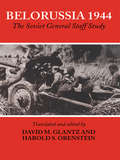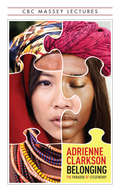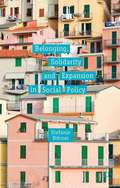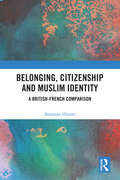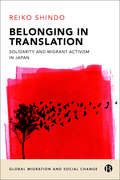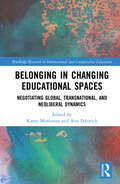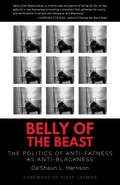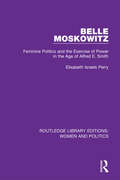- Table View
- List View
Bending Toward Justice: The Birmingham Church Bombing That Changed the Course of Civil Rights
by Doug Jones Greg TrumanThe story of the decades-long fight to bring justice to the victims of the 16th Street Baptist Church bombing, culminating in Sen. Doug Jones' prosecution of the last living bombers. On September 15, 1963, the 16th Street Baptist Church in Birmingham, Alabama was bombed. The blast killed four young girls and injured twenty-two others. The FBI suspected four particularly radical Ku Klux Klan members. Yet due to reluctant witnesses, a lack of physical evidence, and pervasive racial prejudice the case was closed without any indictments.But as Martin Luther King, Jr. famously expressed it, "the arc of the moral universe is long, but it bends toward justice." Years later, Alabama Attorney General William Baxley reopened the case, ultimately convicting one of the bombers in 1977. Another suspect passed away in 1994, and US Attorney Doug Jones tried and convicted the final two in 2001 and 2002, representing the correction of an outrageous miscarriage of justice nearly forty years in the making. Jones himself went on to win election as Alabama’s first Democratic Senator since 1992 in a dramatic race against Republican challenger Roy Moore.Bending Toward Justice is a dramatic and compulsively readable account of a key moment in our long national struggle for equality, related by an author who played a major role in these events. A distinguished work of legal and personal history, the book is destined to take its place as a canonical civil rights history.
Bending History
by Michael E. O'Hanlon Kenneth G. Lieberthal Martin S. IndykBy the time of Barack Obama's inauguration as the 44th president of the United States, he had already developed an ambitious foreign policy vision. By his own account, he sought to bend the arc of history toward greater justice, freedom, and peace; within a year he was awarded the Nobel Peace Prize, largely for that promise.In Bending History, Martin Indyk, Kenneth Lieberthal, and Michael O'Hanlon measure Obama not only against the record of his predecessors and the immediate challenges of the day, but also against his own soaring rhetoric and inspiring goals. Bending History assesses the considerable accomplishments as well as the failures and seeks to explain what has happened.Obama's best work has been on major and pressing foreign policy challenges--counterterrorism policy, including the daring raid that eliminated Osama bin Laden; the "reset" with Russia; managing the increasingly significant relationship with China; and handling the rogue states of Iran and North Korea. Policy on resolving the Israeli-Palestinian conflict, however, has reflected serious flaws in both strategy and execution. Afghanistan policy has been plagued by inconsistent messaging and teamwork. On important "softer" security issues--from energy and climate policy to problems in Africa and Mexico--the record is mixed. As for his early aspiration to reshape the international order, according greater roles and responsibilities to rising powers, Obama's efforts have been wellconceived but of limited effectiveness.On issues of secondary importance, Obama has been disciplined in avoiding fruitless disputes (as with Chavez in Venezuela and Castro in Cuba) and insisting that others take the lead (as with Qaddafi in Libya). Notwithstanding several missteps, he has generally managed well the complex challenges of the Arab awakenings, striving to strike the right balance between U.S. values and interests.The authors see Obama's foreign policy to date as a triumph of discipline and realism over ideology. He has been neither the transformative beacon his devotees have wanted, nor the weak apologist for America that his critics allege. They conclude that his grand strategy for promoting American interests in a tumultuous world may only now be emerging, and may yet be curtailed by conflict with Iran. Most of all, they argue that he or his successor will have to embrace U.S. economic renewal as the core foreign policy and national security challenge of the future.
Bending History
by Michael E. O'Hanlon Kenneth G. Lieberthal Martin S. IndykBy the time of Barack Obama's inauguration as the 44th president of the United States, he had already developed an ambitious foreign policy vision. By his own account, he sought to bend the arc of history toward greater justice, freedom, and peace; within a year he was awarded the Nobel Peace Prize, largely for that promise.In Bending History, Martin Indyk, Kenneth Lieberthal, and Michael O'Hanlon measure Obama not only against the record of his predecessors and the immediate challenges of the day, but also against his own soaring rhetoric and inspiring goals. Bending History assesses the considerable accomplishments as well as the failures and seeks to explain what has happened.Obama's best work has been on major and pressing foreign policy challenges-counterterrorism policy, including the daring raid that eliminated Osama bin Laden; the "reset" with Russia; managing the increasingly significant relationship with China; and handling the rogue states of Iran and North Korea. Policy on resolving the Israeli-Palestinian conflict, however, has reflected serious flaws in both strategy and execution. Afghanistan policy has been plagued by inconsistent messaging and teamwork. On important "softer" security issues-from energy and climate policy to problems in Africa and Mexico-the record is mixed. As for his early aspiration to reshape the international order, according greater roles and responsibilities to rising powers, Obama's efforts have been well-conceived but of limited effectiveness.On issues of secondary importance, Obama has been disciplined in avoiding fruitless disputes (as with Chavez in Venezuela and Castro in Cuba) and insisting that others take the lead (as with Qaddafi in Libya). Notwithstanding several missteps, he has generally managed well the complex challenges of the Arab awakenings, striving to strike the right balance between U.S. values and interests.The authors see Obama's foreign policy to date as a triumph of discipline and realism over ideology. He has been neither the transformative beacon his devotees have wanted, nor the weak apologist for America that his critics allege. They conclude that his grand strategy for promoting American interests in a tumultuous world may only now be emerging, and may yet be curtailed by conflict with Iran. Most of all, they argue that he or his successor will have to embrace U.S. economic renewal as the core foreign policy and national security challenge of the future.
Ben-Gurion: A Political Life (Jewish Encounters Series)
by Shimon Peres David LandauIsrael's current president gives us a dramatic and revelatory biography of Israel's founding father and first prime minister. Shimon Peres was in his early twenties when he first met David Ben-Gurion. Although the state that Ben-Gurion would lead through war and peace had not yet declared its precarious independence, the "Old Man," as he was called even then, was already a mythic figure. Peres, who came of age in the cabinets of Ben-Gurion, is uniquely placed to evoke this figure of stirring contradictions--a prophetic visionary and a canny pragmatist who early grasped the necessity of compromise for national survival. Ben-Gurion supported the 1947 United Nations Partition Plan for Palestine, though it meant surrendering a two-thousand-year-old dream of Jewish settlement in the entire land of Israel. He granted the Orthodox their first exemptions from military service despite his own deep secular commitments, and he reached out to Germany in the aftermath of the Holocaust, knowing that Israel would need as many strong alliances as possible within the European community. A protégé of Ben-Gurion and himself a legendary figure on the international political stage, Shimon Peres brings to his account of Ben-Gurion's life and towering achievements the profound insight of a statesman who shares Ben-Gurion's dream of a modern, democratic Jewish nation-state that lives in peace and security alongside its Arab neighbors. In Ben-Gurion, Peres sees a neglected model of leadership that Israel and the world desperately need in the twenty-first century.From the Hardcover edition.
Ben-Gurion's Political Struggles, 1963-1967: A Lion in Winter
by Zaky ShalomAn essential insight into this central figure in the modern history of Israel and Zionism. This important new study explores the years that built up to the Six Day War and details the crucial issues and events the world is still grappling with today. This book traces Daniel Ben-Gurion’s waning years in Israeli politics. After his resignation from the office of prime minister in 1963, the ‘Old Man’ soon lost faith in his self-chose successor, Levi Eshkol, and ceaselessly tried to undermine the latter’s premiership, eventually forming a breakaway party. The events leading up to the Six-Day War in June 1967 caught Ben-Gurion by surprise. During the weeks-long ‘waiting period’ prior to the outbreak of hostilities, he paid little attention to daily security issues. But when war did erupt, he displayed one of his key leadership skills – the ability to formulate an accurate, independent situation assessment. It will be of interest to scholars working in Israeli politics and history, this is a lucid, thoroughly researched account of the sunset years of the driving force behind the Israeli nation-state.
Ben-Gurion Against the Knesset
by Giora GoldbergThe power struggle between Ben-Gurion and the Knesset was not primarily concerned with who should hold the reins of power, but with the ideals that should lie behind government. Ben-Gurion did not think that the Knesset had the moral backbone required at a historic turning-point in Israeli history, when the character of the nation was being developed; although he conceded that it was capable of dealing with the more mundane administrative tasks. He therefore denied the Knesset the right to take part in the policy-making process, caused a decline in the support of the elite and the general public, encouraged partisanship, and endeavored to reduce competitiveness. Ben-Gurion was so dismissive of the Knesset and its members, that he would not even attend parties at which Knesset members were being given awards.
Ben-Gurion
by Anita ShapiraDavid Ben-Gurion cast a great shadow during his lifetime, and his legacy continues to be sharply debated to this day. There have been many books written about the life and accomplishments of the Zionist icon and founder of modern Israel, but this new biography by eminent Israeli historian Anita Shapira strives to get to the core of the complex man who would become the face of the new Jewish nation. Shapira tells the Ben-Gurion story anew, focusing especially on the period after 1948, during the first years of statehood. As a result of her extensive research and singular access to Ben-Gurion's personal archives, the author provides fascinating and original insights into his personal qualities and those that defined his political leadership. As Shapira writes, "Ben-Gurion liked to argue that history is made by the masses, not individuals. But just as Lenin brought the Bolshevik Revolution into the world and Churchill delivered a fighting Britain, so with Ben-Gurion and the Jewish state. He knew how to create and exploit the circumstances that made its birth possible. " Shapira's portrait reveals the flesh-and-blood man who more than anyone else realized the Israeli state.
Ben Tillman and the Reconstruction of White Supremacy
by Stephen KantrowitzThrough the life of Benjamin Ryan Tillman (1847-1918), South Carolina's self-styled agrarian rebel, this book traces the history of white male supremacy and its discontents from the era of plantation slavery to the age of Jim Crow.As an anti-Reconstruction guerrilla, Democratic activist, South Carolina governor, and U.S. senator, Tillman offered a vision of reform that was proudly white supremacist. In the name of white male militance, productivity, and solidarity, he justified lynching and disfranchised most of his state's black voters. His arguments and accomplishments rested on the premise that only productive and virtuous white men should govern and that federal power could never be trusted. Over the course of his career, Tillman faced down opponents ranging from agrarian radicals to aristocratic conservatives, from woman suffragists to black Republicans. His vision and his voice shaped the understandings of millions and helped create the violent, repressive world of the Jim Crow South.Friend and foe alike--and generations of historians--interpreted Tillman's physical and rhetorical violence in defense of white supremacy as a matter of racial and gender instinct. This book instead reveals that Tillman's white supremacy was a political program and social argument whose legacies continue to shape American life.
Ben Macintyre's World War II Espionage Files: Agent Zigzag, Operation Mincemeat
by Ben MacintyreAgent Zigzag and Operation Mincemeat, two thrilling accounts of World War II espionage, are available together as an ebook—with an excerpt from the New York Times bestseller Double Cross. &“Not since Ian Fleming and John le Carré has a spy writer so captivated readers.&”—The Hollywood ReporterAGENT ZIGZAG • &“Wildly improbably but entirely true . . . [a] compellingly cinematic spy thriller with verve.&”—Entertainment Weekly Eddie Chapman was a charming criminal, a con man, and a philanderer. He was also one of the most remarkable double agents Britain has ever produced. Inside the traitor was a man of loyalty; inside the villain was a hero. The problem for Chapman, his spymasters, and his lovers was to know where one persona ended and the other began. Based on recently declassified files, Agent Zigzag tells Chapman&’s full story for the first time. It&’s a gripping tale of loyalty, love, treachery, espionage, and the thin and shifting line between fidelity and betrayal. OPERATION MINCEMEANT • &“Brilliant and almost absurdly entertaining.&”—The New Yorker Near the end of World War II, two British naval officers came up with a brilliant and slightly mad scheme to mislead the Nazi armies about where the Allies would attack southern Europe. To carry out the plan, they would have to rely on the most unlikely of secret agents: a dead man. Ben Macintyre&’s dazzling, critically acclaimed bestseller chronicles the extraordinary story of what happened after British officials planted this dead body—outfitted in a British military uniform with a briefcase containing false intelligence documents—in Nazi territory, and how this secret mission fooled Hitler into changing military positioning, paving the way for the Allies to overtake the Nazis.
Ben Jonson's Walk to Scotland
by Julie Sanders James Loxley Anna Groundwater James Loxley Anna GroundwaterAt the heart of this book is a previously unpublished account of Ben Jonson's celebrated walk from London to Edinburgh in the summer of 1618. This unique firsthand narrative provides us with an insight into where Jonson went, whom he met, and what he did on the way. James Loxley, Anna Groundwater and Julie Sanders present a clear, readable and fully annotated edition of the text. An introduction and a series of contextual essays shed further light on topics including the evidence of provenance and authorship, Jonson's contacts throughout Britain, his celebrity status, and the relationships between his 'foot voyage' and other famous journeys of the time. The essays also illuminate wider issues such as early modern travel and political and cultural relations between England and Scotland. It is an invaluable volume for scholars and upper-level students of Ben Jonson studies, early modern literature, seventeenth-century social history, and cultural geography.
Ben Franklin Thinks Big (I Can Read Level 2)
by Sheila KeenanThe life of Ben Franklin, a key leader in the founding of the United States, is introduced in this early reader biography.Ben Franklin was a famous inventor, statesman, and writer who helped the thirteen colonies become the United States. From inventing the lightning rod to helping write the Declaration of Independence, his big ideas had a lasting impact on American history. Beginning readers will learn about the milestones in Ben Franklin’s life in this Level Two I Can Read biography. This biography includes bonus materials, complete with a timeline and historical illustrations, including Franklin’s electrical machine invention and his leaf print money that couldn’t be counterfeited.Ben Franklin Thinks Big is a Level Two I Can Read, geared for kids who read on their own but still need a little help. Whether shared at home or in a classroom, the engaging stories, longer sentences, and language play of Level Two books are proven to help kids take their next steps toward reading success.
Ben Fletcher: The Life and Times of a Black Wobbly (Labor Classics Ser.)
by Peter ColeIn the early twentieth century, when many US unions disgracefully excluded black and Asian workers, the Industrial Workers of the World (IWW) warmly welcomed people of color, in keeping with their emphasis on class solidarity and their bold motto: "An Injury to One Is an Injury to All!" Ben Fletcher: The Life and Times of a Black Wobbly tells the story of one of the greatest heroes of the American working class. A brilliant union organizer and a humorous orator, Benjamin Fletcher (1890–1949) was a tremendously important and well-loved African American member of the IWW during its heyday. Fletcher helped found and lead Local 8 of the IWW's Marine Transport Workers Industrial Union, unquestionably the most powerful interracial union of its era, taking a principled stand against all forms of xenophobia and exclusion. For years, acclaimed historian Peter Cole has carefully researched the life of Ben Fletcher, painstakingly uncovering a stunning range of documents related to this extraordinary man. It includes a detailed biographical sketch of his life and history, reminiscences by fellow workers who knew him, a chronicle of the IWW's impressive decade-long run on the Philadelphia waterfront in which Fletcher played a pivotal role, and nearly all of his known writings and speeches, thus giving Fletcher's timeless voice another opportunity to inspire a new generation of workers, organizers, and agitators. This revised and expanded second edition includes new materials such as facsimile reprints of two extremely rare pamphlets on racism from the early twentieth century, more information on his prison years and personal life, additional recollections from friends, greater consideration of Fletcher from a global perspective, and much more.
Belva Lockwood: The Woman Who Would Be President
by Jill NorgrenA legal historian recounts the influential life of the women&’s rights activist who was the first woman to practice at the bar of the Supreme Court. In Belva Lockwood: The Woman Who Would Be President, prize-winning legal historian Jill Norgren recounts, for the first time, the life story of one of the nineteenth century&’s most surprising and accomplished advocates for women&’s rights. As Norgren shows, Lockwood was fearless in confronting the male establishment, commanding the attention of presidents, members of Congress, influential writers, and everyday Americans. Obscured for too long in the historical shadow of her longtime colleague, Susan B. Anthony, Lockwood steps into the limelight at last in this engaging new biography. Born on a farm in upstate New York in 1830, Lockwood married young and reluctantly became a farmer&’s wife. After her husband&’s premature death, however, she earned a college degree, became a teacher, and moved to Washington, D.C., with plans to become an attorney-an occupation all but closed to women. Not only did she become one of the first female attorneys in the U.S., but in 1879 became the first woman ever allowed to practice at the bar of the Supreme Court. In 1884 Lockwood continued her trailblazing ways as the first woman to run a full campaign for the U.S. Presidency. She ran for President again in 1888. Although her candidacies were unsuccessful (as she knew they would be), Lockwood demonstrated that women could compete with men in the political arena. After these campaigns she worked tirelessly on behalf of the Universal Peace Union, hoping, until her death in 1917, that she, or the organization, would win the Nobel Peace Prize. Belva Lockwood deserves to be far better known. As Norgren notes, it is likely that Lockwood would be widely recognized today as a feminist pioneer if most of her personal papers had not been destroyed after her death. Fortunately for readers, Norgren shares much of her subject&’s tenacity and she has ensured Lockwood&’s rightful place in history with this meticulously researched and beautifully written book. Foreword by U.S. Supreme Court Justice Ruth Bader Ginsburg
Beltway Upheaval
by Kenneth GormanThe Country has experienced bizarre political events. First, a contingent election in the House of Representatives after no candidate for president garnered 270 electoral votes. Then, the victorious president resigned suddenly on Inauguration Day. Is President Granger guilty of concealing a secret about resigned President Atkinsen in order to succeed him? Speaker of the House Allcott despises Granger who "stole the presidency from me." Granger foresees a disastrous economic decline. He signs Executive Order 14914 to ward off a depression. Allcott condemns the EO and influences the House to Impeach Granger. The Senate decides Granger's fate. Is Allcott guilty of conspiracies? What is the fallout from the Executive Order? Unexpectedly, Granger takes a leave of absence. Who becomes acting president? BELTWAY UPHEAL is a fictional story of presidential actions and conflicts. Can real transformation happen?
Belt and Road Initiative in South America: Explaining the Varying Responses
by Lunting WuThis book is concerned with the varying responses of South American countries to the Belt and Road Initiative (BRI). Since Beijing launched the Belt and Road Initiative in 2013, 3/4 of countries in the world have engaged with China's arrangement of promoting global physical and digital connectivity. This still leaves a quarter of them that have refused China’s offer so far or withdrawn. How do we account for why countries chose to join the BRI while others do not? Research on South American countries’ responses to the BRI is scant, but the topic is pertinent. While the great-power competition and systemic rivalry have spoiled the appetite of European countries to intensify their ties with China, many developing countries seem to be rather interested. This book will interest scholars of international political economy, geopolitics, foreign policy and international development.
Belt and Road Initiative and South Asia
by Raj Kalyan SharmaBelt and Road Initiative (BRI) has been an obscure concept, and it remains difficult to distinguish what BRI is and isn’t, making it difficult for many governments and global corporations to properly participate in it. I am delighted to present the opinions and perspectives of many eminent researchers, professors and experts from various countries on the Belt and Road Initiative (BRI). The book contains 11 chapters which are written by distinguished researchers and practitioners from various parts of Asia. While these 11 chapters discuss the many characteristics of the BRI, including advantages and costs, they also convey the lessons that many other Southeast Asian countries have learned. Each chapter offers valueable lessons to the countries that have yet to participate in the initiatives.
Beloved Lady: A History of Jane Addams' Ideas on Reform and Peace (The Johns Hopkins University Studies in Historical and Political Science)
by John C. FarrellOriginally published in 1967. Jane Addams was one of the most creative thinkers and activists in the history of American social reform. She pioneered the settlement house movement. She was a leader in the attempt to relate education to the new urban environment for millions of Americans in the early twentieth century. She was a vocal advocate of the Progressive movement and active in the drive for women's rights. She was also an outstanding spokesman for international understanding and world peace. Although Jane Addams is well known as one of the originators of social work in the United States, as an early advocate of a "War on Poverty," and as the proponent of ideas that led to the creation of the modern welfare state, the convictions that motivated her prodigious energy had not, prior to Dr. Farrell's investigation, been carefully examined. He traces the relation between her philanthropic principles and her Progressive politics, her feminism, and her efforts to achieve world peace. He shows how her association with John Dewey and her acceptance of pragmatism changed her thinking and also how her later pacifism alienated her from many progressives of various persuasions. Before his sudden and untimely death at the age of thirty-two, John C. Farrell had just completed this study, based on his examination of virtually every important writing by and about Jane Addams. It is not a full-fledged biography but rather an intellectual history that seeks to explain the origins and relevance of Jane Addams' ideas and activities to the first half of the twentieth century. The manuscript for this book, complete but unrevised, was edited for publication by two of Farrell's colleagues who prefer to remain unidentified. Charles C. Barker, professor of history at Johns Hopkins University, wrote an introduction that places Beloved Lady in the context of scholarly literature on Jane Addams.
Belorussia 1944: The Soviet General Staff Study (Soviet (Russian) Study of War #No. 12)
by Harold S. Orenstein David M. GlantzA new edited translation of the Soviet Staff study of the Red Army's Belorussian operation in the summer of 1944, which was unprecedented in terms of its scale, scope and strategic consequences. The Soviet Stavka had planned a campaign consisting of a series of massive operations spanning the entire Soviet-German front. Four powerful fronts (army groups) operated under close Stavka (high command) control. Over 1.8 million troops acomplished a feat unique in the history of the Red Army: the defeat and dismemberment of an entire German army group. This book is a translation of the Soviet General Staff Study No 18, a work originally classified as 'secret' and intended to educate Soviet commanders and staff officers. The operation is presented from the Soviet perspective, in the words of the individuals who planned and orchestrated the plans. A map supplement, including terrain maps, is provided to illustrate the flow of the operation in greater detail.
Belonging: The Paradox of Citizenship (The CBC Massey Lectures)
by Adrienne ClarksonNever has the world experienced greater movement of peoples from one country to another, from one continent to another. These seismic shifts in population have brought about huge challenges for all societies. In this year’s Massey Lectures, Canada’s twenty-sixth Governor General and bestselling author Adrienne Clarkson argues that a sense of belonging is a necessary mediation between an individual and a society. She masterfully chronicles the evolution of citizenship throughout the ages: from the genesis of the idea of the citizen in ancient Greece, to the medieval structures of guilds and class; from the revolutionary period which gave birth to the modern nation-state, to present-day citizenship based on shared values, consensus, and pluralism. Clarkson places particular emphasis on the Canadian model, which promotes immigration, parliamentary democracy, and the rule of law, and the First Nations circle, which embodies notions of expansion and equality. She concludes by looking forward, using the Bhutanese example of Gross National Happiness to determine how we measure up today and how far we have to go to bring into being the citizen, and the society, of tomorrow.
Belonging, Solidarity and Expansion in Social Policy
by Stefanie BörnerThis book examines the relationship of belonging and social policy in a historical-comparative perspective reconstructing individual arguments in favour of or opposed to the expansion of solidarities.
Belonging, Citizenship and Muslim Identity: A British-French Comparison
by Stéphane HlaimiThis book explores belonging among Muslims in Britain and France, asking whether British and French Muslims are citizens first or Muslims first. Based on in-depth interviews with Muslims in both jurisdictions, it considers three options open to Muslims – assimilation, integration, or conflict – and considers the differences in approach that tend to prevail among Muslims in Britain and France, with British Muslims tending to favour a cohabitationist strategy, while many French Muslims adopt a more conflictual approach.With attention to issues of Islamophobia, the author examines the crises multiculturalism and secularism are facing, and argues for a more inclusive rhetoric on questions of Islam and citizenship, to counter the essentialist, ‘othering’ approach that characterises media coverage and public discourse.A call for a new paradigm of articulation between Muslim identity and Western citizenship, Belonging, Citizenship and Muslim Identity will be of interest to scholars of sociology, politics, geography and anthropology with interests in inclusion and diasporic communities.
Belonging in Translation: Solidarity and Migrant Activism in Japan (Global Migration and Social Change)
by Reiko ShindoThis is the first book to investigate how migrants and migrant rights activists work together to generate new forms of citizenship identities through the use of language. Shindo's book is an original take on citizenship and community from the perspective of translation, and an alluring amalgamation of theory and detailed empirical analysis based on ethnographic case studies of Japan.
Belonging in Changing Educational Spaces: Negotiating Global, Transnational, and Neoliberal Dynamics (Routledge Research in International and Comparative Education)
by Karen Monkman Ann FrkovichThis book explores the impacts on personal and professional, local and global forms of belonging in educational spaces amidst rapid changes shaped by globalization. Encouraging readers to consider the idea of belonging as an educational goal as much as a guiding educational strategy, this text forms a unique contribution to the field. Drawing on empirical and theoretical analyses, chapters illustrate how educational experience informs a sense of belonging, which is increasingly juxtaposed against a variety of global dynamics including neoliberalism, transnationalism, and global policy and practice discourses. Addressing phenomena such as refugee education, large-scale international assessments, and study abroad, the volume’s focus on ten countries including Japan, Sierra Leone, and the US demonstrates the complexities of globalization and illuminates possibilities for supporting new constructions of belonging in rapidly globalizing educational spaces. This text will benefit researchers, academics, and educators with an interest in international and comparative education, multicultural education, and educational policy more broadly. Those interested in the sociology of education and cultural studies within education will also benefit from this volume.
Belly of the Beast: The Politics of Anti-Fatness as Anti-Blackness
by Da'Shaun L. HarrisonExploring the intersections of Blackness, gender, fatness, health, and the violence of policing.To live in a body both fat and Black is to exist at the margins of a society that creates the conditions for anti-fatness as anti-Blackness. Hyper-policed by state and society, passed over for housing and jobs, and derided and misdiagnosed by medical professionals, fat Black people in the United States are subject to sociopolitically sanctioned discrimination, abuse, condescension, and trauma. Da&’Shaun Harrison--a fat, Black, disabled, and nonbinary trans writer--offers an incisive, fresh, and precise exploration of anti-fatness as anti-Blackness, foregrounding the state-sanctioned murders of fat Black men and trans and nonbinary masculine people in historical analysis. Policing, disenfranchisement, and invisibilizing of fat Black men and trans and nonbinary masculine people are pervasive, insidious ways that anti-fat anti-Blackness shows up in everyday life. Fat people can be legally fired in 49 states for being fat; they&’re more likely to be houseless. Fat people die at higher rates from misdiagnosis or nontreatment; fat women are more likely to be sexually assaulted. And at the intersections of fatness, Blackness, disability, and gender, these abuses are exacerbated. Taking on desirability politics, the limitations of gender, the connection between anti-fatness and carcerality, and the incongruity of &“health&” and &“healthiness&” for the Black fat, Harrison viscerally and vividly illustrates the myriad harms of anti-fat anti-Blackness. They offer strategies for dismantling denial, unlearning the cultural programming that tells us &“fat is bad,&” and destroying the world as we know it, so the Black fat can inhabit a place not built on their subjugation.
Belle Moskowitz: Feminine Politics and the Exercise of Power in the Age of Alfred E. Smith (Routledge Library Editions: Women and Politics)
by Elisabeth Israels PerryIt is commonly believed that women’s entry into the political realm is a recent phenomenon. Originally published in 1992, Belle Moskowitz shatters that myth, restoring to history the career of a remarkable woman who achieved unprecedented influence and power in American politics many decades before the contemporary era. As political advisor to Alfred E. Smith, four-term governor of New York and presidential candidate. Moskowitz played a crucial role in both state and national politics throughout the 1920s. Elisabeth Israels Perry, who is Moskowitz’s granddaughter, has thoroughly searched through private and public records to document Moskowitz’s career, drawing as well on the reminiscences of Moskowitz’s daughter Miriam Israels Gabo. This outstanding biography was co-winner of the New York State Historical Association Manuscript Prize in 1987.
